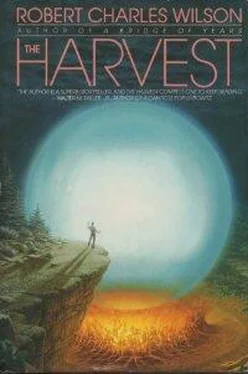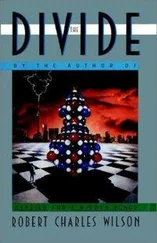“Damn,” he said, and massaged his shoulder.
He could have gone inside, where Chuck Makepeace was talking by radio to Avery Price, the Boston guy, but Kindle distrusted this business about Ohio. It was where everybody wanted to go, a new Promised Land, a Place Prepared; worse, it was where the Helpers wanted them all to go. Boston and Toronto were both travelling with Helper guides, and probably so were a bunch of small towns like Buchanan.
At least they called it guiding. Another word for it was herding. All the wild human beings were being assembled in one place—and Kindle guessed there were other such places on other continents, little reservations, little corrals. Barns. Pens.
He didn’t like that idea at all.
No doubt, he thought, the promises were true. Everybody would be defended against the weather; the land would be fertile and the skies would be blue. They would all be well cared for.
Like cattle.
Cattle were well cared for. Cattle were also slaughtered.
He put three more shots into the bole of the tree and then stopped because his right shoulder felt damn near dislocated.
The sky was a high, luminous blue brushed with cloud. The air smelled of brine. There had been ground fogs every morning for the last week. Sunsets had been wide and vivid.
If old bones tell the weather, Kindle thought, then something big was indeed about to break. The last few days he had been sleeping restlessly. This morning, he had woken up at dawn in a cold sweat. His body felt tight, as if it was braced for something.
He turned and squinted across the bay. The water was choppy, whitecaps feathering in a stiff breeze.
The ocean, Kindle thought.
Dear God, what mischief had been committed out there?
* * *
Storms were already raking the east coast as the President of the United States prepared to leave the White House.
He was alone in the building. The First Lady had abandoned her skin many weeks before. Elizabeth had been captivated by the Greater World and had wanted to explore it in greater detail, an impulse William understood; in any case, she had never liked bad weather. It frightened her.
William, on the other hand, had been a devotee of thunder, a relisher of storms.
It was not entirely his aim to relish the weather that had already begun to wreak so much destruction. There were still many mortal human beings on the surface of the Earth… and many of them would die, despite the best efforts of the Helpers. But it was the paradox of the senses that they did not make such distinctions. A stormy sky made his skin tingle, his pulse quicken, no matter what the circumstances.
Fundamentally, though, it wasn’t the storms William wanted to see; it was the country—the nation he had once governed, if “govern” was a meaningful verb.
That was why he had clung to the flesh even after Elizabeth went Home. (Besides, she was not really absent, merely less accessible.)
Only a small minority of Contactees had retained their corporate bodies, and many of those, like William, had changed or were changing themselves in some critical way.
After all: it wouldn’t do to go tramping across the landscape in an old man’s cumbersome shell.
Therefore William went to bed for a week; and while he slept the neocytes altered certain genetic instructions and ran his cell division at a feverish pace. He radiated heat, and when he woke he was many pounds lighter than he had been. He was also younger.
He peered at himself in a full-length mirror and saw a face he hadn’t seen since the year the Allies marched into Berlin.
What age would he have guessed this boy to be? Twelve? Thirteen?
Anticipating the change, William had obtained some clothes to fit before he went to sleep. He dressed himself in blue jeans and a T-shirt and fresh running shoes. The shoes were a little loose; he’d had to guess at the size. But how glorious.
He felt newly minted. He felt like a bright penny.
He felt restless and hungry. The White House seemed suddenly bigger and more ridiculous than ever, and he couldn’t wait to get away from its stifling frills and history. He thought of all those miles of America opening out from his doorstep, a continent like a long empty beach.
William laughed a high child’s laugh and ran down the steps of the Main Portico.
The sky that day was heavy and fat with clouds.
* * *
By January, the albedo of the planet had risen considerably.
Traveller-engineered phytoplankton laced the surface waters of the tropics. Like crystals of fine glass, they bounced sunlight back into the sky.
Above these vast reflective ocean plains, domes of moisture-laden air punched into the troposphere. Convection clouds the shape of fists rose and flared into cirrostratus.
From orbit, the tropics resembled a fractal image, a fury of greater and lesser whorls. The air above the sea was knotted with hurricane crowns.
Individual pressure cells broke loose and travelled with the prevailing currents like tall ships of wind, wound tighter as they penetrated the cooler latitudes.
Some rode the monsoon drift into India and Asia. Some rode the equatorial currents to Australia or Africa. Some followed the Gulf Stream across the East Indies into the Gulf of Mexico.
A few rode the Kuroshio Current to Japan and then veered eastward, gaining new strength over the phytoplankton-heated North Pacific, and turned at last like lazy giants toward the coast of North America.
The storm, once a comfortably distant threat, seemed to hurry closer as the days passed.
Matt organized the men into a work crew, nailing plywood sheets over accessible windows on the first floor of the hospital and crossing the plate glass with duct tape. The hospital was a relatively new building, constructed under a strict State building code for regional emergency centers. Essentially, it was a three-story reinforced-concrete bunker. It stood on high ground in a neighborhood of middle-income residences and tall conifers. The basement contained a records room, generator room, laundry room, heating and plumbing, and a kitchen and staff cafeteria.
Matt chose the cafeteria to serve as shelter. It was a cheerless cinder-block box painted salmon pink, but it was spacious and well away from any exterior walls. Tables were shoved up against the service line to make room for mattresses and bedding. By the first Thursday in March the storm was still a day or two away, according to the Helper, but the shelter was as complete as Matt could make it, and people had already begun to truck in their valuables, protecting photographs, souvenirs, memories against the wind.
Abby Cushman served as coordinator, keeping in close touch with all nine members of the Emergency Planning Committee and relaying Helper updates. She conferred with Matt by telephone and they chose Friday at 6:00 p.m. as the hour when everyone should be in the hospital basement, doors closed, exits bolted.
“Incidentally,” Abby said, “I heard about Rachel. I’m terribly sorry, Matt.”
Matt accepted her condolences. Abby had recently lost her husband and two grandchildren to what Rachel had called the Greater World. For a moment, an unspoken understanding flowed between them. Then Matt was hailed by Bob Ganish, who had run out of duct tape; Abby said, “Tomorrow at six—and everybody better be there!”
* * *
The storm was preceded by strange gusts of warm air, flurries of rain, a racing overcast.
Matt had expected something sudden, a burst of weather as quick and violent as a spring thunderstorm. Tom Kindle, ferrying canned food down to the hospital kitchen, told him it wouldn’t be that way. A typhoon—which was what this was, if not something even more powerful, still nameless—wasn’t a localized event. It was a vortex of air, miles wide, slow at the edges, more intense as you moved toward the eye… or as the eye moved toward you. It would not come all at once; but it would come quickly, insidiously.
Читать дальше












